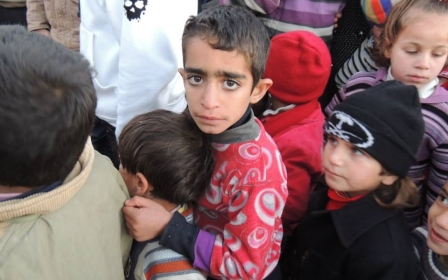UN presses Syria on aid flow as regime blocks medical supplies

The UN said Turkey's Nusaybin border gate into Syria was a vital corridor to deliver humanitarian aid to Syrian people, but the Syrian government should allow two other border gates to be used to reach more people.
"We have identified 262 locations that we are not able to get in where approximately 3.5 million Syrian people live," John Ging, a senior official from the UN humanitarian affairs agency, told a press conference in Geneva on Friday.
He said the agency was "pressing very hard" for having Syrian government allow the use of two other border crossing points from Turkey.
The UN requested from Turkey on March 6 to allow the passage of a cross-border humanitarian convoy into Syria through the Nusaybin/Kamisli border gate. Turkey responded positively to the request.
Between March 20-25, the UN sent 78 convoys carrying food, blankets, mattresses, family and hygiene kits, medicine and medical supplies across Turkey's borders to northern Syria.
Stay informed with MEE's newsletters
Sign up to get the latest alerts, insights and analysis, starting with Turkey Unpacked
"There are 3.5 million people in the hard-to-reach areas who are effectively inaccesible to aid efforts and 240,000 people are in beseiged areas. They are truely abandoned," Ging said.
He stressed that the negative impact of the ongoing civil war on surrounding countries were getting worse and neighbouring countries should be financially supported.
Syria has remained in the throes of conflict since early 2011 when a peaceful uprising against President Bashar al-Assad escalated into full-fledged civil war following a violent government crackdown.
According to the UK-based Syrian Observatory for Human Rights, more than 150,000 people have been killed since the conflict began more than three years ago.
Assad regime removing medical supplies
Ging accused the Syrian government on Friday of blockading medical supplies from convoys bound for opposition-held areas.
"Medical supplies are being removed from convoys as part of a strategy to deny the wounded medical care. This is an abomination," John Ging, the UN director of Syria aid operations, told reporters in Geneva.
"It's the government of Syria who are either not authorising the free movement of all the medical supplies that need to move, or whose officials are removing from the convoys the medical supplies that they feel could be used to treat the war wounded. This is wholly and totally unacceptable," he said.
Ging did not single out particular incidents and, while lambasting the government over medical supplies, underlined that hampering aid was a tactic by all involved in the Syrian civil war.
He said it was up to countries with influence over the rival sides to help break the deadlock.
"The government has first responsibility. They claim sovereignty, we deal with them on that basis, that they are in the first instance responsible for ensuring that humanitarian action is facilitated throughout the country," he said.
"We also know, at an operational level, that we need the cooperation of many others, armed groups and different organisations," he added.
With 3.5 million Syrians in areas that aid convoys are able to reach only sporadically, and with over 240,000 stuck in besieged communities, blockades have become a powerful tool.
Ging said that even though 9.6 million Syrians have been affected by the conflict, including nearly three million refugees who have fled to overstretched neighbouring countries, the crisis was slipping from the headlines.
"We're becoming numb to the scale and the extent of the brutality of this conflict on ordinary people," he said.
Ging urged Syria's warring sides and the international community to revive stalled peace efforts.
"We have to address those with the responsibility and capacity to end this conflict, enjoin them to the responsibility to do that. So far, all that we've heard are words of condemnation, words of sympathy for the people on the ground," he said.
"The valid question to ask political leaders is how long, how many more people will you accept to be killed before you do something different? Because it's 5,000 a month at the moment, and it's over 150,000 already. Is it 200,000, is it a quarter of a million, is it a million people? What is the trigger for a new action?"
Middle East Eye delivers independent and unrivalled coverage and analysis of the Middle East, North Africa and beyond. To learn more about republishing this content and the associated fees, please fill out this form. More about MEE can be found here.




